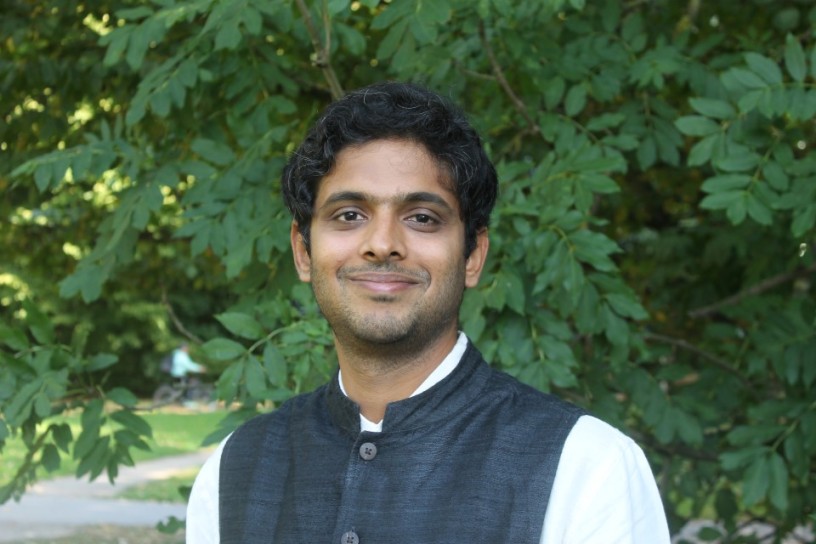Please tell us about yourself
Sandeep Pai, a student in the MSc in Environmental Sciences, Policy and Management (MESPOM) program at Central European University (CEU), received the prestigious Ramnath Goenka Award for his investigative journalism work uncovering high-level corruption in India. Sandeep used Right to Information requests to find out how Indian MPs used their influence to persuade public sector undertakings (PSUs) to fund publications, organizations and events associated with the politicians.
Original Link :
https://www.ceu.edu/article/2017-02-22/ceu-student-sandeep-wins-prestigious-indian-award-journalism
Sandeep is a journalist, researcher, and environmental professional. He started his career as a journalist, working with leading Indian newspapers such as the Hindustan Times and Daily News and Analysis in Delhi and Mumbai. Over the years, he has extensively researched and reported on the energy and environment sectors. He has gained first-hand experience by interacting with technicians and experts in several coal mines and coal bed methane projects, wind and solar farms, power plants and transmission grids, and oil and gas projects.
Tell us about your work?
“Why would a public sector undertaking like Coal India or National Thermal Power Corporation place advertisements in a Marathi magazine called Brahman Manas (which roughly translates to Brahmin Mindset)? Why would a PSU, for that matter, fund boat races in Kerala or sponsor events for a certain animal rights organization?” asks Sandeep in the opening article of his five-part series about high-level corruption in India.
During his four-month-long investigation, Sandeep used India’s Right to Information Act to request documents and information to uncover how members of the Indian parliament and even ministers used their official letterheads to point out to leaders of state-owned enterprises how “beneficial” it would be for them to fund certain newspapers through advertisements or give money to organizations or events. These undertakings were directly or indirectly connected to the politicians.
One politician went so far as to write that despite giving “good and positive coverage,” the recipient PSU has not advertised enough in a certain newspaper. The newspaper in question is published by a company that’s chaired by the same politician.
Sandeep had trouble getting news outlets to publish the stories.
“Even though I have put a lot of work into these stories, and they were based on solid evidence, two newspapers I have worked for never got to actually publishing them,” Sandeep said. Eventually when he was accepted to CEU’s MESPOM program, he decided to leave his job, and published his story at an independent investigative site, newslaundry.com.
He received the 2016 Ramnath Goenka Excellence in Journalism Award in the “investigative reporting in print media” category for his work. The award is named for the legendary publisher best known for challenging Indira Gandhi during the time of “Emergency” with his newspaper The Indian Express.
What are the challenges in your profession?
When asked about the dangers of investigative journalism in India, Sandeep said that he was generally pursuing white-collar crimes, and in the worst case “they drag you to court,” but if one is dealing with the sand mafia, for example, one can expect to be bullied or receive death threats. On the other hand, he says, if one is patient enough, one of the big newspapers might eventually run stories like his, unless it interferes with their publishing company’s business interests, which are intertwined with many sectors of economy.
How did you end up in such an offbeat, unconventional and interesting career?
Sandeep got into journalism because of his interest in public life, and because it was difficult to find a job as an engineer in India during the crisis. “My first editor decided to give a chance to the new generation, that’s how I got sucked into the frantic world of journalism. Though eventually I got frustrated by the Indian situation, I don’t want to give up on my career,” he said. He added that his exposure to an international community and learning academic writing and thinking at CEU has greatly broadened his horizons.
“I can effectively use my skills acquired as a journalist in academia and vice versa. I know how to acquire information, how to be persistent. At the same time, the international outlook and the professional network I built at CEU is vital for moving my career forward both in environmental sciences and journalism,” Sandeep said.
What did you study before coming to CEU?
I did my Post Graduate Diploma in Print & Web Journalism from Indian Institute of Journalism & New Media.I studied print and web journalism and specialized in investigative reporting.
What are you doing currently?
Presently Sandeep is working on his thesis at MESPOM, a comparative analysis of off-the-grid household-level solar systems in Nairobi, Kenya and the Bihar region in India. He is conducting field research to assess the level of development and make recommendations based on his findings.
MESPOM is an Erasmus Mundus Masters program in Environmental Sciences, Policy and Management operated by four leading European and two North American universities. MESPOM prepares students for identifying and implementing solutions to complex environmental challenges, especially in an international context. This course is jointly taught at the Central European University, Hungary, Lund University, Sweden, the University of Manchester, UK, and the University of Aegean, Greece.
